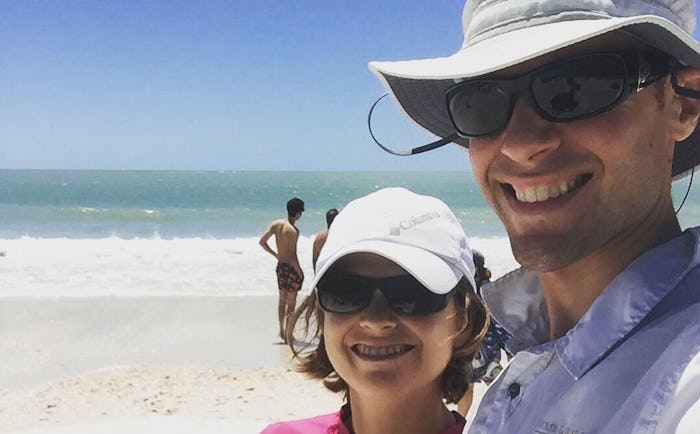Life

I Knew Twins Were Possible, But Oh No I'm Pregnant With Triplets
Romper's Trying project follows five women with very different stories through a year of trying to conceive. Where discussions about fertility often focus on the end goal, they'll document what it's like emotionally, physically, and spiritually before you get there — the anxiety, the hope, the ovulation kits, the tests. How do you function when getting pregnant or carrying a pregnancy to term isn't a given? Read on for one woman's answer to that question.
Jackie and her husband have been trying since late 2016. She suffers from hypothalamic amenorrhea, and this is the twelfth installment of her Trying diary. You can read the previous entry here.
Triplets. Holy Moses.
It’s been a few weeks and I am still processing the news. But as I scour the internet for information and insight day after day after day, one thing keeps repeating in my head: my life is over.
A second ago I was elated, and now I’m terrified. Scared and angry and sad. And guilty for being so selfish as to feel this way over children I was willing to do anything to conceive. I feel like the Little Mermaid after she’s turned her voice over to Ursula and realizes what she has sacrificed in a deal with the maritime devil.
Twins, of course, were always a possibility with fertility treatments. Plenty of people manage with twins. But triplets isn’t just adding one more to the mix. It’s exponentially more challenging and riskier.
Okay, here comes the biggest challenge of my life: how are you going to respond?
More than 90 percent of triplets are born pre-term, and the average triplet pregnancy only goes about 32 to 34 weeks, rather than 40 weeks. More than half of triplets are born at low birth weight, and with prematurity and low birthweight come a whole host of potential problems: respiratory issues, GI distress, poor eyesight or hearing, cerebral palsy. Triplets spend on average a month in the NICU.
And then when they come home, God help you. You better have people to bring you food and help you do your laundry.
I guess being antisocial hermits is going to bite us in the rear.
I’m happy, I swear. But it’s not the sort of over-the-moon joy that you see in the movies or that people — including your own husband — expects from you. It’s more of an “Okay, here comes the biggest challenge of my life: how are you going to respond?” So I dig in. The journalist-slash-researcher in me starts scouring every publication in print and online to get information. I need to be prepared.
But the more I read, the less prepared I feel. Thank goodness I haven’t experienced the massive nausea that is common with multiples. Because all of this reading is making me ill. I have to stop.
My first OB appointment is a complete cluster****: the fertility clinic didn’t send my chart over, so the doctors had no idea they were getting a patient with triplets. Then they couldn’t get a needle in my arm and I almost passed out on the table, again. I feel slightly better when Dr. B says he’s delivered triplets before and that I am in much better health and shape than the 50-year-old he just shepherded through pregnancy. I can even keep exercising so long as I do “nothing new and nothing stupid.”
A year ago I was angry and frustrated about where my body was, where my mind was.
There are going to be a ton of these appointments, with multiple doctors and specialists, each one with their own opinion on what I should and shouldn’t do. It’s hard to figure out how much to heed and when to follow my own body’s sensation and intuition, especially when it’s your first.
JP being gone at the U.S.-Mexico border isn’t helping, either. But he gets back at the end of the month, we can start the logistical planning: cribs, car seats, strollers, nursery décor.
Planning and preparing helps me keep my mind away from fearing the unknowns of the babies and my changing body and what I am doing and not doing to give them the best foot forward.
One night when I am up hungry at 2 a.m., I think back on the past year. A year ago I was angry and frustrated about where my body was, where my mind was, and whether I was going to be barren forever. Now I have proof that is not the case, even if it was not result I expected. Life is funny like that.
The satisfaction of completing a race or a tough training cycle never lasts very long; it’s always onto a new challenge. My fertility race is over, but if this two-year marathon wasn’t enough, fate has given me a new challenge: a nine-month pregnancy ultramarathon and then the rest of my life trying to be a solid parent role model to three little ones.
I can say I am officially in training. Not for an Ironman race, but to become an IronMom.